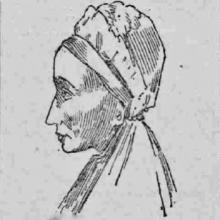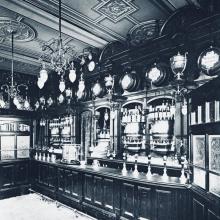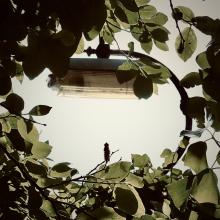
1864–66
THEFT OF A WATCH AND CHAIN.
Isabella Raphael or M’Pherson and John Robertson were charged with the theft of a silver watch, a gold chain, and twenty shillings in silver from the person of a gentleman.
It appears that the gentleman in question accompanied the female prisoner to her house in Greenside Row on the 2d inst., and that before long time had elapsed, he missed his watch and chain. After some fruitless efforts to recover them, in the course of which the male prisoner was introduced, and promised to find them on payment of 20s., the unfortunate dupe lodged information with the police.
The property has not yet been recovered. The prisoners were remitted to a higher Court.
Caledonian Mercury, 5 May 1863
*****
POLICE COURT—Friday.
(Before Bailie Russell.)
[…]
CHILD STRIPPING.
Mary Borthwick, nine years of age, residing in Rose Street, and Elizabeth Fleming, aged seven years, residing in Meuse Lane, were charged with five different acts of theft, committed during the month of August.
In all the cases the thefts were from very young children, the ages varying from two to six years, and in most cases the victims were stripped of their clothing to a great or less extent.
The charges were found proven, and the young delinquents were sentenced to sixty days’ imprisonment.
Caledonian Mercury, 19 September 1863
*****
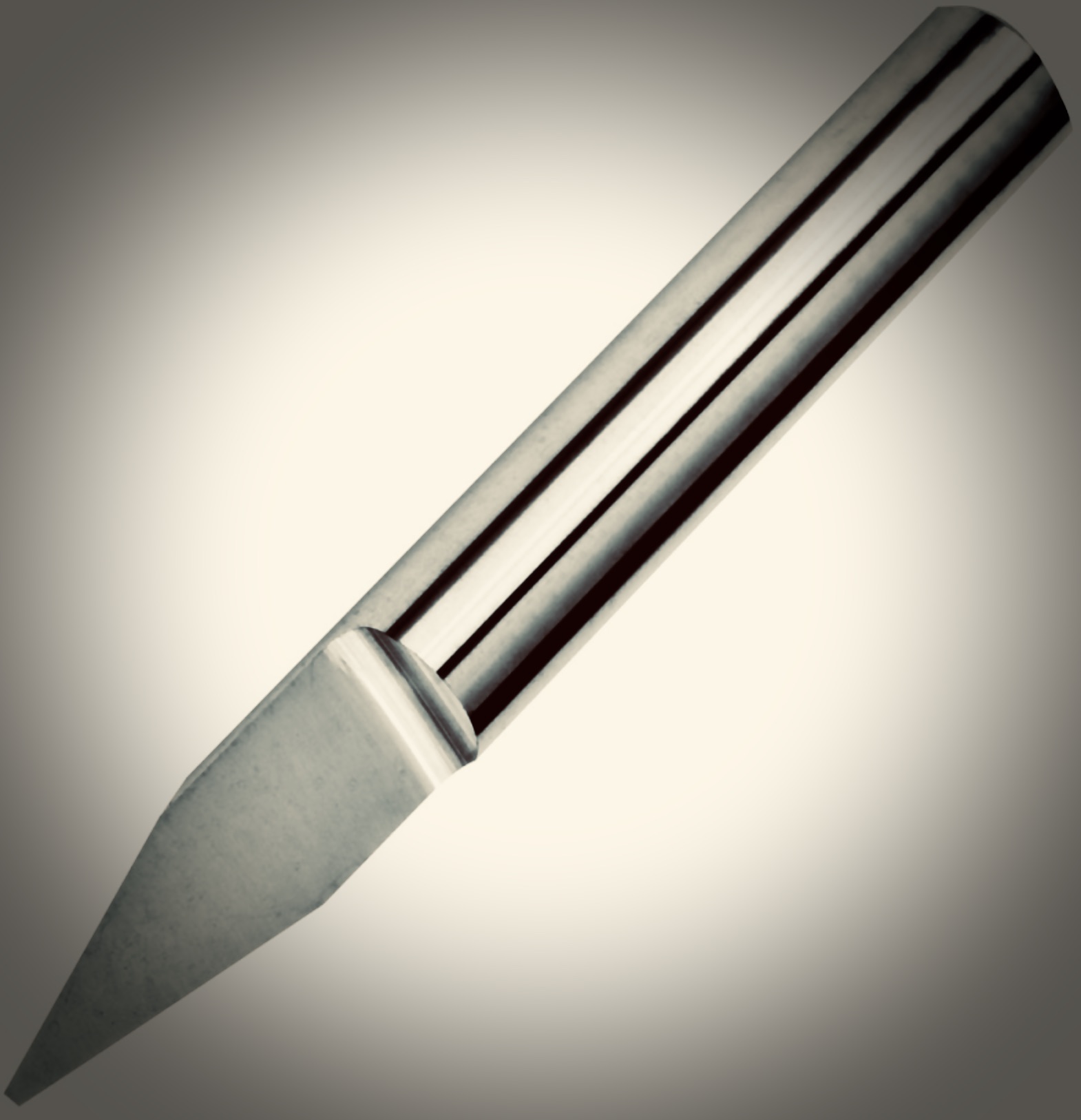
SHERIFF CRIMINAL COURT
(Before Sheriff Jameson.)
William Milne, residing in Greenside Row, Edinburgh, pleaded guilty to assaulting a constable of the Edinburgh Police at Greenside House grounds on the 27th July last, by stabbing him with a draw-point.[1]
Having been previously convicted of assault, he was sentenced to three months’ imprisonment with hard labour.
Caledonian Mercury, 22 September 1863
[1] Sharp tool used for engraving.
*****
FIRE IN A WOODYARD AT ATHOLE CRESCENT LANE.—Yesterday, a serious fire broke out in a series of woodyards in Athole Crescent Lane, by which a valuable stock of fine woods was burned.
There are three woodyards in the lane, standing on parallel sites, belonging respectively to Messrs Brown & Jamieson, joiners; Mr Simpson, cabinetmaker, George Street: and to Mr Keddie, South Charlotte Street.[2] The fire originated in Messrs Brown & Jamieson’s workshop, which is the farthest west of the three establishments, and was caused by the overflow of a pot of glue, which an apprentice was heating, a few minutes before ten o’clock, preparatory to the return of the workmen after their breakfast hour.
The shop was full of shavings, which caught and spread the fire so rapidly that four or five men who had just entered were perfectly powerless to stop the flames, and could not even save their tools. The shop, which was a mere wooden shed, was burned to the ground in a few minutes; and the flames, fanned by a gentle north-west wind, soon extended through the yard, and in less than half-an-hour communicated the fire to the adjoining woodyard, belonging to Mr Simpson.
The wood in both yards was stacked for drying, and being thoroughly dried by the heat of the sun during the past fortnight, burned rapidly. The stock in Messrs Brown & Jamieson’s yard—which consisted mostly of plain deal, and is roughly estimated to have been worth from £150 to £200—was completely destroyed.[3] The stock in Mr Simpson’s yard was more valuable, consisting principally of Spanish mahogany and other fine woods, mainly intended to be used for veneering purposes.
The greater part of this stock was destroyed by the fire, and what remained was very much damaged in being removed to a place of safety by the rough handling of a willing but inexperienced and unorganised mob. The loss is estimated at between £500 and £600, and is partly covered by insurance.
A fire-engine arrived upon the scene a little before eleven o’clock, and instantly commenced playing upon the flames. A hose was also brought to bear upon the burning wood; but the supply of water being rather scant, the exertions of the firemen were necessarily confined to saving the surrounding premises. At one time a range of stables on the north side of the yards was threatened—indeed, one or two windows had caught fire—and Mr Keddie’s yard was also in imminent danger.
Some damage was done to the wood in the last-mentioned yard in its removal and by the action of the water from the engines, but the damage was fully covered by insurance. The fire was got under about twelve o’clock, but for several hours thereafter the engine and hose continued playing on the charred and smouldering embers.
Scotsman, 27 July 1864
[2] According to the Post Office Directory: Brown & Jamieson, ‘house carpenters, joiners, and undertakers', Hope Street Lane; Richard Simpson, ‘upholsterer, undertaker, appraiser, and house agent’, 121 George Street; Thomas Keddie, ‘cabinet maker and appraiser’, 7 and 14 Melville Place.
[3] About £11,800 today, or 1,000 days' wages for a skilled tradesman in 1864.
*****
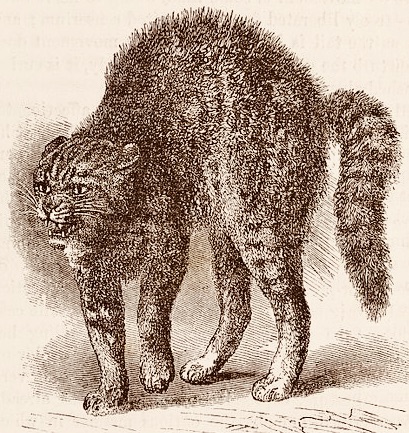
CRUELTY TO ANIMALS—On the complaint of the Scottish Society for the Prevention of Cruelty to Animals, Jane White or Kellerman was on Saturday charged before Bailie Alexander, in the Burgh Court, with having thrown a cat from a window of her dwelling-house at the back of No. 2 Greenside Place, on the forenoon of Tuesday the 19th inst.
The cat fell from a height of nine storeys down into Greenside Court, was thereby cruelly injured, and died in great agony sometime thereafter.
The accused was found guilty, and, after a very serious admonition, the Bailie said he would award a moderate penalty. She was fined 15s., including costs, with the alternative of five days’ imprisonment.[4]
Caledonian Mercury, 3 August 1864
[Image: Wikipedia, creative commons.]
[4] About £44 today, or 3 days' wages for a skilled tradesman in 1864.
*****
PIANOFORTE
Mr W. HATELY, Pupil of the CONSERVATORIUM of Music at Leipzig, respectfully intimates that he has returned to Edinburgh.
Applications to be addressed 17 Duke Street (Lane).[5]
Caledonian Mercury, 6 October 1865
[5] Until 1967, Duke St ran between Dublin St at the junction with Albany St and Queen St. Duke St Lane was the name given to today’s Dublin St Lane South. The change of names was to avoid confusion with the identically named street and lane in Leith.
*****
CAPTURE OF TWO PICKPOCKETS.—On the afternoon of the 27th ult., as a lady residing in Bellevue Crescent was walking along Scotland Street Lane, she was accosted by two men, who asked her the way to Royal Circus.
She told them the way and walked on, but had not gone far when she missed her purse, containing two £1 notes, half a sovereign in gold, and some silver. On finding her purse gone she immediately informed the police, but up to Monday no trace of the pickpockets was discovered.
On Monday, however, Detectives Golan and Stewart observed two men answering the description walking together in York Place.[6] The officers crossed the street to meet them, but the two men separated.
On being brought together they at first denied that they knew each other, afterwards, however, admitting that they did, but said they had only come to Edinburgh the day before. They were taken to the Police Office, and being confronted by the lady were identified as the men who had accosted her in the street.
They gave their names as John Brown and Robert Johnston, both residing in Dunbar Street. They were brought up yesterday before Bailie Miller, and having been found guilty, were each sentenced to sixty days’ hard labour.
Caledonian Mercury, 6 December 1865
[6] We last encountered Golan in an article in the Caledonian Mercury dated 22 April 1858 (News from the Mews 9).
*****
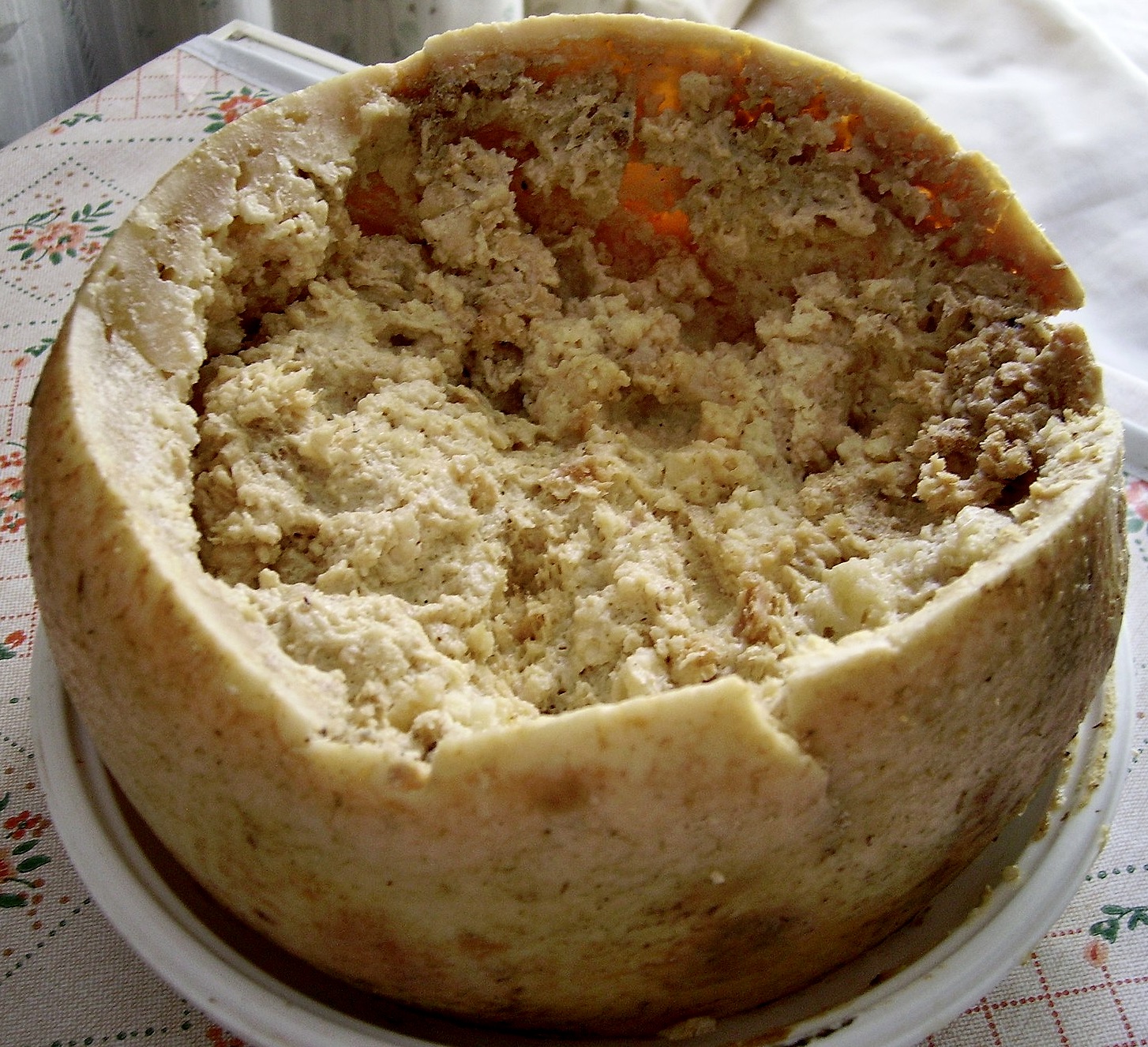
DISEASED CHEESE.—At the Police Court on Saturday—Bailie Alexander on the bench—a merchant named Archibald Cowan, residing in Calton Place, was charged with having, on the 11th inst., and in contravention of the 115th section of the Edinburgh Police Act, in his possession and exposing for sale in his premises, 340 lbs. weight of cheese and 10 lbs. of ham, both being in a state unfit for human food.
He pleaded guilty and was sentenced to pay a fine of £10, or suffer thirty days’ imprisonment.
Caledonian Mercury, 16 October 1865
[Image from Wikipedia, creative commons, where the entry on Sardinian casu marzu makes for mouthwatering reading.]
*****
CONTRAVENTION OF PRIVY COUNCIL ORDERS.
At a Justice of the Peace Court for the county of Edinburgh, held yesterday—Mr Walker of Bowland and Sir James Gardiner Baird on the bench—the following cases, at the instance of Mr List, Justice of Peace Fiscal, were disposed of:—
[…] Mr James Martin, farmer, Corstorphine, pleaded guilty to removing from Broughton Lane to the farm of Old Saughton, a cartload of dung, on the 16th of February, and was fined £1 with 17s. of costs. […].[7]
Edinburgh Evening Courant, 28 February 1866
[7] Broughton Lane was another name for Broughton St Lane. Privy Council restrictions between 1865 and 1867 were introduced to restrict transmission of a highly contagious and fatal cattle plague (Rinderpest or Steppe Murain). The fine was equivalent to about £63 today, or 5 days' wages for a skilled tradesman in 1866.
*****
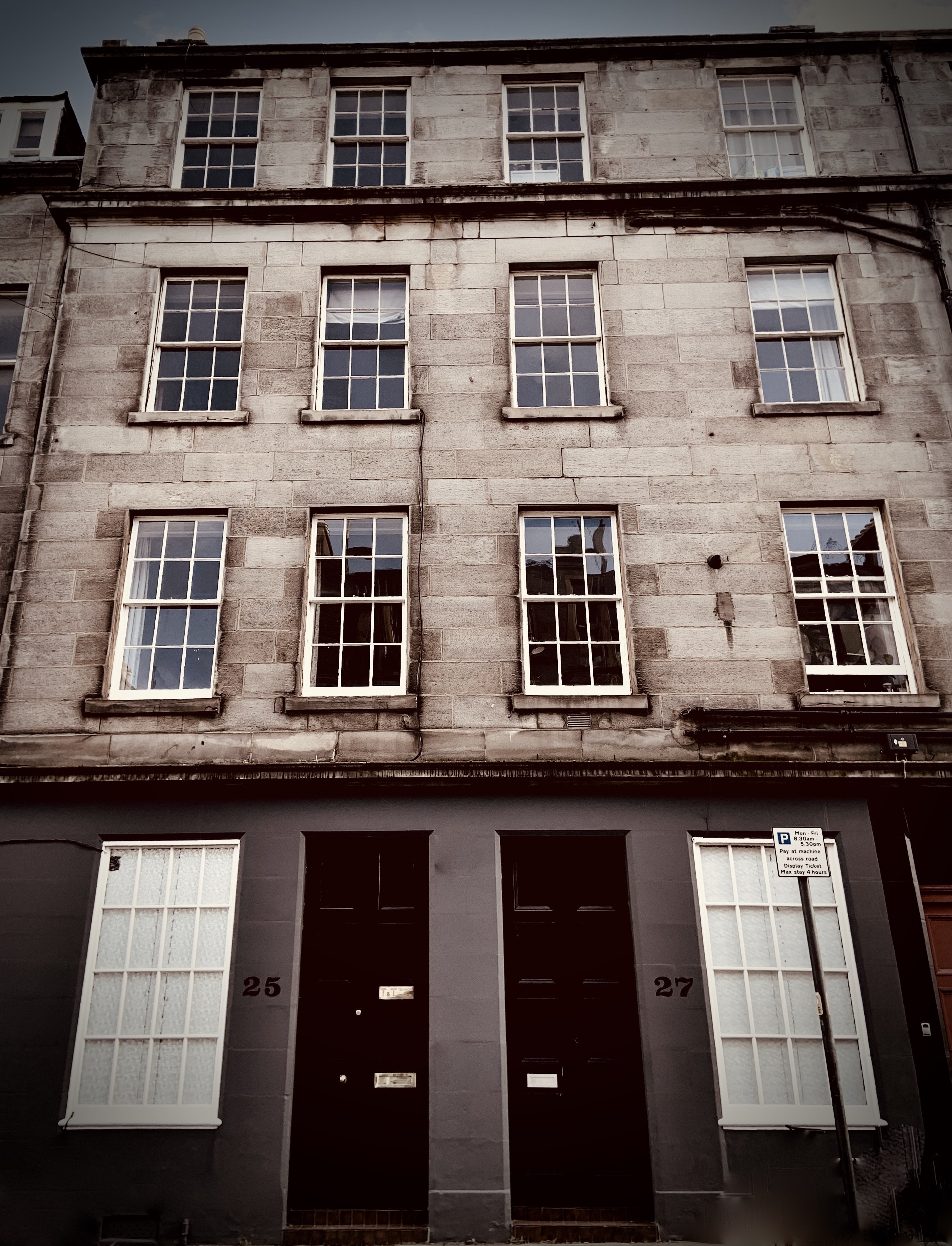
TOWN COUNCIL PROCEEDINGS.
[…]
THE SMOKE NUISANCE.
A petition was presented from the proprietors and tenants in tenement No. 25 Barony Street, complaining of smoke from the chemical works of Messrs Sang and Barker[8] in Barony Street, and also from two smiths’ shops in Albany Lane.
This petition gave rise to some discussion as to the prevalence of the smoke nuisance in the city, and the steps that should be taken to remedy it. Ultimately it was agreed to remit the petition to the Streets and Buildings Committee.
Caledonian Mercury, 23 May 1866
[Image: Courtesy of DM.]
[8] Sang & Barker were, according to the Post Office Directory, ‘wholesale druggists, manufacturing chemists, drysalters, and oil merchants'.
*****
CAUTION TO SWEEPS
A chimney sweep, named Borthwick, was fined 5s. for shaking bags of soot in Gayfield Lane.[9]
[9] Tongue twister of 19th-century origin: ‘The sweep shook his sooty sheet in the city street'.
Caledonian Mercury, 11 July 1866
*****
ASSAULT ON A CABMAN—A cab proprietor named Peter Jardine was charged, before Bailie Falshaw yesterday, with having assaulted a man in his employment, named George Cranston, striking him with piece of wood and knocking him down.
Cranston said that about half past eleven o’clock on Saturday last he went with his horse and cab into the stables of Mr Jardine, in Dublin Street Lane.[10] His master first quarrelled with him about the washing of the horse’s feet, and then about the money he had brought in. Mr Jardine got in a rage and struck him with a piece of wood above the left eye, knocked him down, and tried to choke him.
He was rescued by two companions who were waiting for him outside. These two men were called, and corroborated the evidence of Cranston with regard to the assault, but they did not know the cause of it. They also said that on interfering Mr Jardine ran after them with a stick.
Mr Jardine said that he had struck the man in self-defence. Cranston had refused go to a house as requested by Mr Jardine, and he (Mr Jardine) told him that he had a good mind not to give him his wages, and that he would lodge a complaint against him. Cranston swore he would have his wages, and then attacked him.
The charge was found proven, and the panel was ordered to pay a fine of £2, or suffer seven days’ imprisonment.[11]
Edinburgh Evening Courant, 18 August 1866
[10] Dublin St Lane was, until 1967, the name given to today’s Dublin St Lane North and Dublin St Meuse.
[11] About £125 today, or 10 days' wages for a skilled tradesman in 1866. Jardine was a cab proprietor and livery stable keeper. We shall hear more of his tumultuous business life in August 1872.
*****
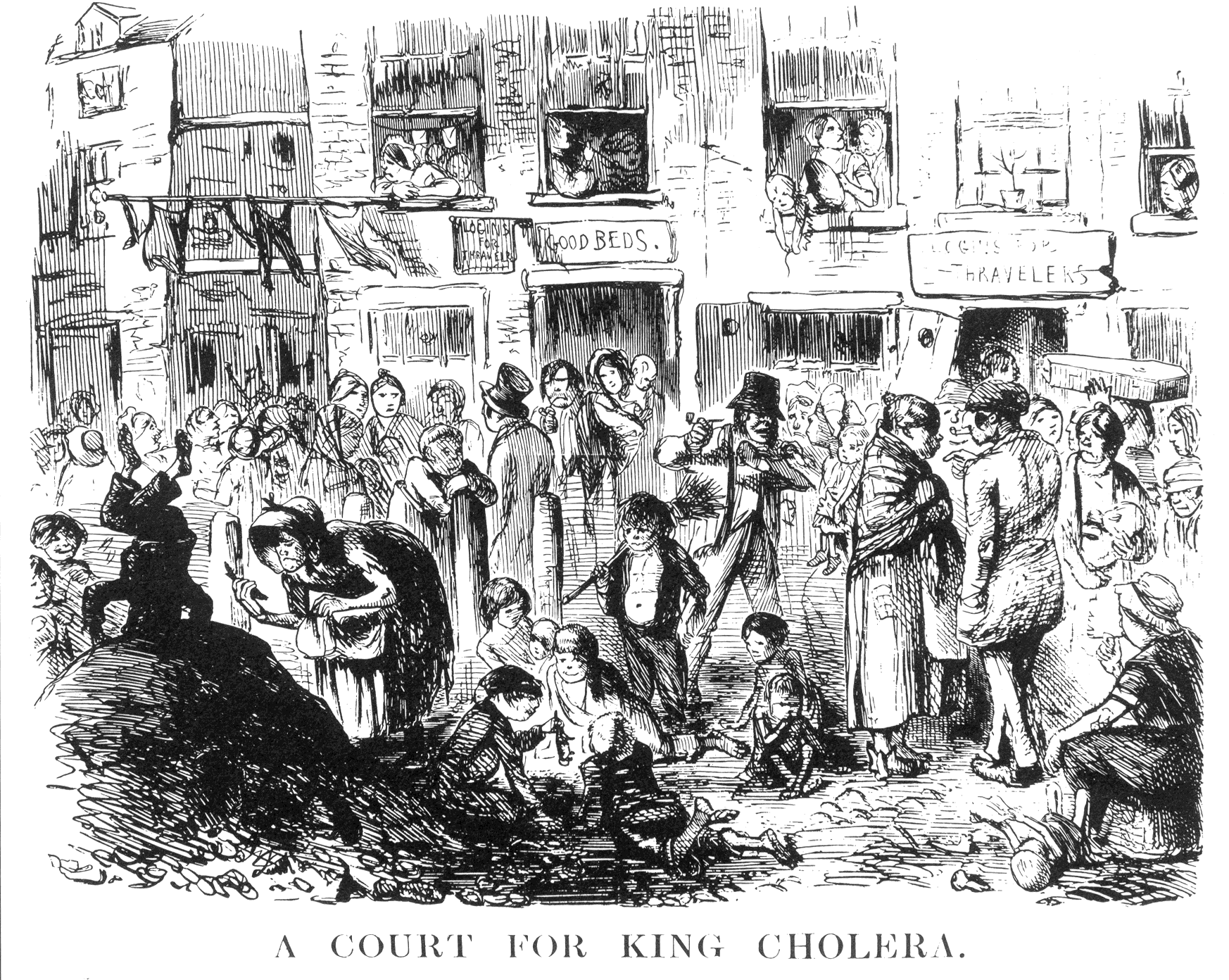
THE CHOLERA.
Much alarm was occasioned in Edinburgh yesterday afternoon and evening by reports of a case of cholera having occurred in Greenside Row.[12]
The facts appear to be that an old man named Peter Mackie, a coppersmith, was on Wednesday seized with cramp while at his work but was able to walk home, where he was attacked by severe diarrhoea.
Notwithstanding all the warning given, medical aid was not obtained until eleven o’clock yesterday forenoon, when the patient had become so exhausted as to render aid of no avail. The man died in the course of the afternoon.
The case is authoritatively stated not to be one of Asiatic cholera; and it is probable that, had a medical man been sent for on the man’s return home on Wednesday, his life might have been saved.
Notwithstanding the many rumours that have been put in circulation, it is gratifying to know that up to the present time not a single case of Asiatic cholera has occurred in Edinburgh. […]
Caledonian Mercury, 24 August 1866
[Image: Wikimedia commons.]
[12] Outbreaks of cholera occurred in 1831–32 (21,800 deaths in England, 10,000 in Scotland); 1848–49 (60,000 deaths across the UK); 1853–54 (20,099 deaths in England) and 1866 (14,378 deaths in England).
*****

